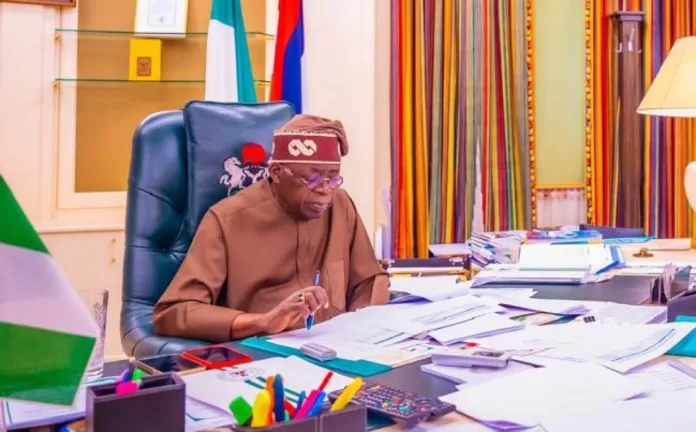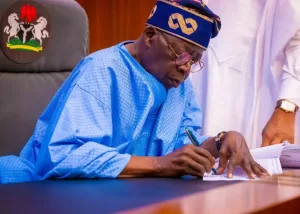On Tuesday, November 19, 2024, President Bola Ahmed Tinubu wrote to the National Assembly, formally requesting approval for a new external Loan of $2.209 billion (₦1.767 trillion) to help finance Nigeria’s fiscal deficit in the 2024 budget.
This request is part of Nigeria’s broader fiscal strategy to address the ₦9.17 trillion deficit projected in the 2024 Appropriation Act.
In his letter to the Senate President, Senator Godswill Akpabio, the President explained that the loan would be raised through the issuance of Eurobonds or other external borrowing instruments. The loan is designed to help bridge the gap in Nigeria’s fiscal plan for 2024.
“The first defendant never intended to provide the nominal complainant with the Naira equivalent of the Dollar,” the letter indicated, underlining the urgency of mobilizing funds to ensure the timely implementation of the 2024 budget.
Tinubu’s request emphasized that the borrowing is in line with the provisions of Sections 21(1) and 27(1) of the Debt Management Office (DMO) Establishment Act of 2003.
The President further authorized the Honorable Minister of Finance and Coordinating Minister of the Economy, along with the Debt Management Office (DMO), to take all necessary steps to execute the plan following approval by the National Assembly.
He noted that the terms and conditions for the borrowing had been provided in a detailed summary attached to the letter, to guide the Senate’s review process.
“The loan is based on an exchange rate of N800 to $1,” Tinubu said in the letter, which was also read during plenary by the Speaker of the House of Representatives, Tajudeen Abbass.
If approved, the loan will be used to part-finance the budget deficit of ₦9.7 trillion, which is included in the 2024 fiscal year projections.
The letter concluded with a plea for swift legislative action, highlighting the importance of a timely resolution to implement the borrowing plan. In response, Senator Akpabio referred the matter to the Committee on Local and Foreign Debts, chaired by Senator Aliyu Wamako, with instructions to report back within 24 hours.
Tinubu’s request marks another step in the Nigerian government’s ongoing efforts to manage its fiscal challenges and stimulate economic growth through strategic external financing.
This move follows the Federal Executive Council’s (FEC) approval of the $2.2 billion borrowing plan on Thursday, which forms part of Nigeria’s 2024 budget financing.
As of the first quarter of 2024, Nigeria’s external debt stood at $42.12 billion.
The latest borrowing plan, if approved, is expected to raise the total external debt to $45.1 billion by the end of the year. This would further add to the mounting fiscal burden that the country faces, which includes rising debt servicing costs.
The country’s cost of servicing foreign debt has increased sharply, with debt servicing rising by 107.7 percent to reach ₦3.8 trillion. This far exceeds the projections made in the 2024 budget, where the initial estimate for foreign debt servicing was ₦1.83 trillion. By August 2024, Nigeria had spent ₦3.8 trillion servicing its foreign debt, an increase of ₦1.97 trillion over the budgeted amount.
In total, Nigeria had budgeted ₦7.41 trillion for debt servicing during the period, covering both domestic and foreign debt, as well as sinking funds and interest on government bonds. However, the government had already paid ₦5.51 trillion, representing 34.4% of the total debt servicing budget.
READ ALSO: Tinubu Seeks Approval For 3 REC Nominees From Senate
This surge in debt servicing costs comes as Nigeria continues to grapple with a growing debt burden. As of June 2024, the country’s total public debt had ballooned to ₦134.2 trillion, up from ₦87.3 trillion in June 2023.
The sharp increase of ₦46.9 trillion in just one year reflects the country’s continued borrowing, both from domestic and external sources, despite mounting concerns over the sustainability of such debt levels.
Domestic debt alone has reached ₦71.2 trillion, while external debt stands at ₦63 trillion. This heavy reliance on borrowing, coupled with the rising cost of debt servicing, has sparked concerns about the long-term economic stability of the country.
The devaluation of the naira has also compounded the situation, increasing the local currency cost of servicing external debt. As a result, Nigeria’s debt per capita—the average amount each Nigerian owes—has surged to approximately ₦620,000, a staggering figure given the country’s population of over 216 million people.
This has raised serious concerns about the country’s ability to meet its debt obligations in the future without further exacerbating its fiscal pressures.
In addition to seeking approval for the loan, President Tinubu has also forwarded the Medium Term Expenditure Framework and Fiscal Strategy (MTEF/FSP) for 2025-2027 to parliament, alongside a bill to amend the National Social Investment Programme.
The proposed amendment aims to make the social register the primary tool for implementing the federal government’s social welfare programs.
With this latest borrowing plan, President Tinubu is betting on external financing as a key strategy to address Nigeria’s fiscal deficit and stimulate economic growth. However, the sustainability of this approach remains a key concern among economic analysts, especially as the country faces mounting debt servicing pressures.


